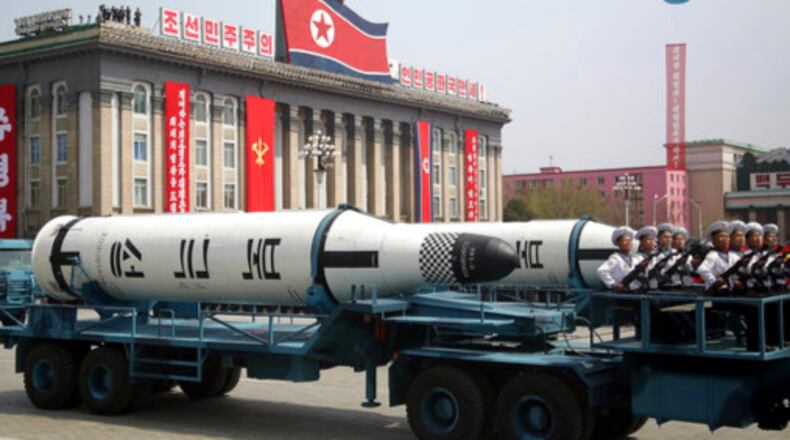Several media outlets are reporting that a U.S. cyberattack sabotaged North Korea’s missile launch on Sunday.
According to the former British foreign secretary, Sir Malcolm Rifkind, the missile test likely failed because the U.S. interfered with the workings of the missile's system.
"It could have failed because the system is not competent enough to make it work, but there is a very strong belief that the U.S. -- through cyber methods -- has been successful on several occasions in interrupting these sorts of tests and making them fail," Rifkind told the BBC on Sunday.
The missile test came a day after the national celebration of the birth of Kim Il-Sung, the founder of North Korea and the grandfather of the country’s current leader, Kim Jung-Un. The parade in Pyongyang, the capital of North Korea, featured various weapons, including 56 missiles.
A New York Times story in March reported on a U.S.operation designed to disrupt North Korea's nuclear missile program. The operation was begun three years ago under President Barack Obama's administration.
According to the report, Kim was "widely reported to have ordered an investigation into whether the United States was sabotaging North Korea's launches, and over the past week he has executed senior security officials."
Deputy National Security Adviser K.T. McFarland declined to comment on "Fox News Sunday" about reports that the U.S. might have used a cyberattack to down the medium-range missile.
“You know we can’t talk about secret intelligence and things that might have been done, covert operations,” McFarland said. “I really have no comment.”
Still, McFarland said cyber warfare is no longer the stuff of science fiction, but is happening now.
“I do think we are entering a whole new era, not just with North Korea but with everybody,” McFarland said. “With any country, major country, we are entering a cyber platform, a cyber battlefield. That is where a lot of the wars of the future are going to be fought.”
It is not yet known if the missile was carrying a nuclear device or a conventional warhead. North Korea has conducted five nuclear tests in the past.
Here’s what we know about the test:
When did it happen?
The test was on Sunday, 24 hours after a celebration of the birthday of the founder of North Korea.
What type of missile was it?
That is not yet known. An unnamed White House source told The Associated Press that it was a medium-range ballistic missile.
Where did the test take place?
The missile was launched from Sinpo, North Korea. Sinpo is on the country’s east coast and is 182 miles from Seoul, South Korea.
Did the U.S. know this was coming?
North Korean leader Kim Jung-Un had hinted that a test might take place. According to McFarland, the U.S. had good intelligence information that a missile would be tested over the weekend.
What’s next?
That's not clear, but it depends on North Korea's next move. North Korea has indicated that it will continue to test missiles and will work to develop a warhead that can fit on an intercontinental missile and hit other countries that are far away, such as the United States.
Other nations, including China, are said to be considering their own responses to the test.
H.R. McMaster, President Donald Trump’s national security adviser, said Sunday that short of military action, a range of responses are on the table.
"It's time for us to undertake all actions we can, short of a military option, to try to resolve this peacefully," McMasters said on ABC's "This Week.” "We are working together with our allies and partners and with the Chinese leadership to develop a range of options."
McMaster said that there is “international consensus” that North Korea needs to be pressured into ending the missile testing.
What has been done so far?
A defensive missile system was sent to South Korea, and Japanese officials said they are preparing for the possibility that they would have to evacuate 60,000 Japanese citizens from South Korea should war break out.
The USS Carl Vinson aircraft carrier group is sitting off the Korean Peninsula, and China said on Friday that North Korea had to be stopped from reaching an "irreversible and unmanageable stage" as far as nuclear weapons are concerned.
About the Author
Keep Reading
The Latest
Featured


